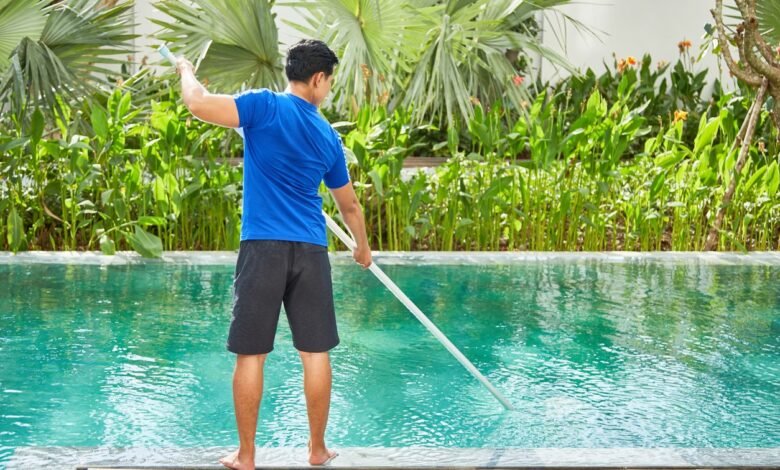
Keeping your pool in pristine condition between scheduled services is essential for its longevity and your enjoyment. Regular maintenance not only ensures a clean and inviting swimming environment but also extends the lifespan of your pool equipment. Neglecting routine upkeep can lead to problems such as algae growth, cloudy water, and equipment malfunctions, which may require costly repairs or professional intervention. By proactively managing these tasks, you can prevent such issues and keep your pool ready for use at all times. This guide provides practical steps and tips for maintaining your pool effectively, ensuring that you can enjoy a sparkling, clean swimming experience every time.
Understanding the Basics of Pool Maintenance
Effective pool maintenance starts with understanding the basics. Maintaining your pool involves regular checks and upkeep to ensure optimal water quality and equipment performance. At its core, pool maintenance includes cleaning the pool, balancing the water chemistry, and checking the equipment. By adhering to these fundamentals, you can prevent common issues like algae growth, cloudy water, and equipment malfunctions.
One crucial aspect is skimming the pool’s surface daily to remove debris. This prevents leaves and other particles from sinking and causing potential problems. Additionally, ensuring the water level is consistent helps maintain proper circulation and filtration. Keeping an eye on these basic tasks helps you stay ahead of more significant issues that could arise.
Furthermore, understanding the importance of routine checks is key to effective maintenance. Regularly inspecting your pool’s equipment, such as the filter and pump, ensures they are functioning correctly. Small problems addressed early can prevent costly repairs and extend the life of your pool components.
Daily and Weekly Pool Care Routines
Maintaining your pool yourself involves establishing both daily and weekly routines. On a daily basis, it’s essential to skim the surface to remove floating debris, which helps keep the water clean and reduces the load on your pool’s filtration system. Additionally, check the water level regularly to ensure it stays within the recommended range. A proper water level supports effective circulation and filtration, crucial for maintaining water clarity and quality.
Weekly maintenance tasks include cleaning the pool’s walls and floor. Use a pool brush to scrub away any dirt or algae that may have accumulated. This prevents buildup and keeps your pool looking pristine. Additionally, test the water chemistry at least once a week to ensure the levels of chlorine, pH, and alkalinity are within the recommended ranges. Adjustments may be necessary to maintain balanced water chemistry, which is vital for preventing issues like algae growth and ensuring swimmer comfort.
Another important weekly task is to check and clean the pool filter. A clogged or dirty filter can reduce the efficiency of your pool’s filtration system, leading to poor water quality. Regular cleaning helps maintain optimal performance and prolongs the lifespan of your filter.
Managing Pool Water Chemistry
Proper water chemistry is a cornerstone of maintaining your pool. Balanced water chemistry not only keeps the water clear but also prevents issues such as corrosion and scaling. The primary elements to monitor are chlorine levels, pH, and total alkalinity. Chlorine keeps the water sanitized by killing bacteria and algae. Aim for a chlorine level between 1 and 3 parts per million (ppm) to ensure effective sanitation.
The pH level of your pool water should be maintained between 7.2 and 7.8. A pH that is too high or too low can affect the effectiveness of chlorine and cause irritation to swimmers. Regularly testing and adjusting the pH ensures that your water remains comfortable and sanitary.
Total alkalinity is another critical factor, as it helps stabilize the pH level. Maintain total alkalinity between 80 and 120 ppm to ensure consistent pH levels and prevent fluctuations. Use appropriate chemicals to adjust these levels as needed. Consistent monitoring and adjustment of your pool’s water chemistry are essential for a healthy and enjoyable swimming environment.
Caring for Pool Equipment
The pool filter plays a vital role in removing debris and impurities from the water. It’s important to clean or replace the filter cartridges or backwash the filter as recommended by the manufacturer. A clean filter improves water flow and enhances overall filtration efficiency.
Additionally, if your pool has a heater, ensure it is operating efficiently by checking for any signs of malfunction or reduced performance. Regular maintenance and prompt repairs help extend the life of your pool equipment and maintain a smooth swimming experience. Proper care of your pool equipment reduces the risk of unexpected breakdowns and costly repairs, ensuring that you can enjoy your pool to the fullest.
Maintaining your pool equipment is crucial for ensuring that your pool remains functional and efficient. For those in Victorville, relying on a cleaning pool service Victorville can be helpful, but performing regular maintenance yourself is equally important. The pool pump, filter, and heater are the primary components that require attention. The pump circulates the water, ensuring that it moves through the filter and is properly sanitized. Regularly check the pump for any signs of wear or malfunction, such as unusual noises or leaks, and address these issues promptly to prevent further damage.
Dealing with Common Pool Problems
Even with regular maintenance, you may encounter common pool problems that require attention. Algae growth, cloudy water, and equipment issues are some of the most frequent concerns. Algae can develop if chlorine levels are too low or if there’s a lack of circulation. To address algae issues, ensure your chlorine levels are adequate and consider using an algaecide if needed. Regular brushing and vacuuming can also help prevent algae from taking hold.
Cloudy water can be caused by various factors, including poor filtration, imbalanced water chemistry, or high debris levels. Address cloudy water by checking and adjusting the water chemistry, ensuring the filter is clean and functioning correctly, and skimming or vacuuming the pool to remove any floating particles.
Equipment problems, such as a malfunctioning pump or filter, can affect the overall performance of your pool. Regular inspections and prompt repairs are crucial to addressing these issues before they escalate. By staying vigilant and addressing these common problems promptly, you can maintain a clean and enjoyable pool environment.



